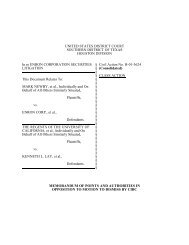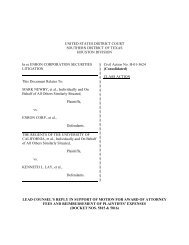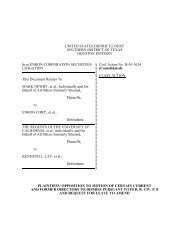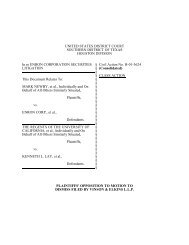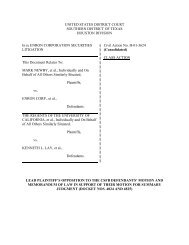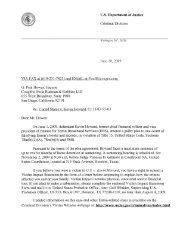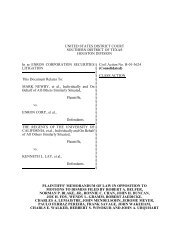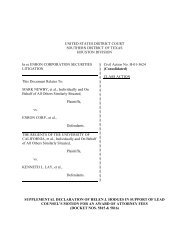Declaration Of Helen J. Hodges In Support Of Lead Counsel's ...
Declaration Of Helen J. Hodges In Support Of Lead Counsel's ...
Declaration Of Helen J. Hodges In Support Of Lead Counsel's ...
You also want an ePaper? Increase the reach of your titles
YUMPU automatically turns print PDFs into web optimized ePapers that Google loves.
elieved it would be beneficial to the Class for Enron to be a defendant not because we could collect<br />
from Enron, but because the PSLRA allows a plaintiff to collect an “up-charge” from other<br />
defendants found liable in the event a defendant is unable to meet the judgment. For example, if<br />
Enron and the banks were defendants at trial and the jury found Enron’s proportionate fault was 25%<br />
and the banks’ share was 65% of a $20 billion judgment, investors could collect $5 billion from the<br />
banks (in addition to the $13 billion attributable to the banks) because Enron is unable to pay the $5<br />
billion judgment. Enron argued that if a single bank were found to be a “knowing” violator,<br />
investors could collect the entire judgment from that bank; therefore, there was no need to add Enron<br />
as a defendant. After a second hearing and further letter briefs, Judge Gonzalez denied the motion<br />
without prejudice to renewal when the deadline for adding defendants was set in Newby.<br />
235. Late in October 2003, the banks filed a motion in Enron’s bankruptcy proceeding to<br />
prevent us from having access to the sworn statements (i.e., depositions) of bank employees obtained<br />
by the Bankruptcy Examiner. We not only opposed their motion, within days we filed a motion to<br />
compel the production of the sworn statements, which the banks and Enron had, in our case in<br />
Houston. The banks expected that Judge Gonzalez would grant their motion and that Judge Harmon<br />
would follow his lead. They won the first round, but we ultimately won that battle. We argued<br />
before Judge Gonzalez that we should not be barred from access to the Bankruptcy Examiner’s<br />
discovery which was in the possession of the banks in our case. He granted the banks’ motion for a<br />
protective order to prevent investors from having access to the discovery obtained by the Bankruptcy<br />
Examiner. Judge Harmon noted that she would ordinarily “defer to his ruling,” but that granting<br />
access would streamline the discovery in the civil case and “fairness dictates that all parties to the<br />
litigation should have access to the non-privileged information concerning the lawsuit.” 3/16/04<br />
Order on Motions to Compel the Banks to Produce the Sworn Statements and Deposition Transcripts<br />
of Their Employees (Docket No. 2021) at 4.<br />
- 130 -



